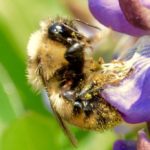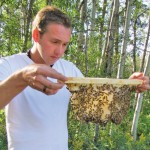Reading Time: 3 minutes Having bees around your canola field might be good for your yield, but the exact details of how and why are not known yet. That’s where people like Shelley Hoover, apiculture researcher with Alberta Agriculture and Forestry in Lethbridge, comes in. Hoover’s research deals with bee health, bee pollination, and the impacts bees have on […] Read more

Alberta honeybees are busy — but not well understood
Researcher says there’s a lot to learn about how honeybees could be used to further boost canola yields

Wild bees can boost your yields
FarmTech: There’s an estimated 300 species of wild bees in Alberta, and they can’t be beat as pollinators
Reading Time: 3 minutes Wild bees buzzing around your field can give you a bigger bang for your buck than honeybees or leafcutter bees. That’s because they actually do a better job of pollinating, said bee specialist Ralph Cartar. “Our whole world is built around managed bees and using honeybees as best we can, but in fact, the most […] Read more

App offers instant link to bee disease info
The free app will be enhanced to allow picture uploads, and that will boost the bee pest surveillance database
Reading Time: < 1 minute Alberta beekeepers will have better access to bee disease and treatment information through a new mobile app developed by Alberta Agriculture and Forestry. The free app for iPhone and Android is an easy-to-use tool that will link beekeepers to pictures and current information about pests, diseases and recommended management practices. “Our province has one of […] Read more

Study of bumblebee decline points to climate ‘vise’
A study of the shrinking range of bumblebee habitat suggests farmers relying on those species to pollinate crops may soon have to look elsewhere, barring a reversal of climate change — or, perhaps, an “assisted migration.” An international study of specimens from 31 species of bumblebees in North America and 36 such species in Europe, as […] Read more

Tiny number of bees account for most crop pollination, study finds
Oslo | Reuters — Just two per cent of wild bee species do almost 80 per cent of their work in pollinating crops, according to a study on Tuesday that outlined simple measures for farmers to attract star insects to safeguard food production. The international report, based on 90 studies in five continents, said governments […] Read more

Pesticides could lead to ‘pollination deficit,’ EU report says
Brussels | Reuters –– Evidence is mounting that widely-used pesticides harm moths, butterflies and birds as well as bees, adding to concerns crop production could be hit by a shortage of pollinators, according to a report drawn up for EU policymakers. The European Commission, the EU executive, placed restrictions on three neonicotinoid pesticides from Dec. […] Read more

Alberta farm receives national pollinator award
Grass Roots Family Farm near Ferintosh has diversified into agroforestry
Reading Time: < 1 minute Grass Roots Family Farm is the 2014 recipient of the Canadian Farmer-Rancher Pollinator Award, which recognizes the contributions farmers make towards protecting pollinators and pollinator habitats. The 250-acre farm near Ferintosh, south of Camrose, is operated by Michael, Laura and Takota Coen. The Coens have been practising sustainable farming since the late 1980s, with son […] Read more
Survival of the fittest key to developing new variety
Reading Time: < 1 minute Plant breeders usually look at huge numbers of plants when searching for particular traits. But Agriculture Canada research scientist Surya Acharya took a survival-of-the-fittest approach to finding a hardy and competitive sainfoin variety for alfalfa-sainfoin pastures. He transplanted plugs of seedlings into pure alfalfa stands, and used those that thrived to create the new Mountainview […] Read more

